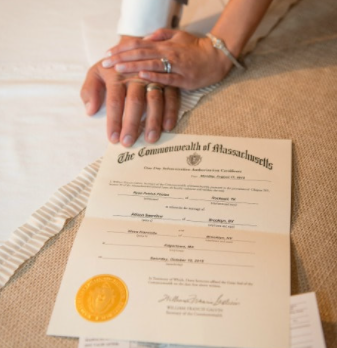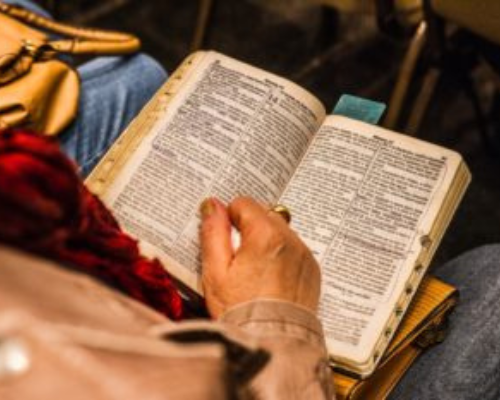Do I Need a Marriage License? Maybe that’s the better question.
“Marriage License and Registration, Please”
A Necessary Question
At some point in your life you asked the government’s permission for something you should never need approval for in the first place. Though you have a God given right protected by the Constitution, you swallowed your pride, took your marching orders and got in lock step with the government. Don’t be embarrassed, you’re not alone.
Today the government has its hand in every taxpayer’s pocket. From starting a business to building a house, to going fishing with a family member, people obtain licenses for almost everything. The idea of government “licensing” us has become so commonplace most fail to give it a second thought.
It is not pertaining to fishing or starting a business that the most curious aspect of licensing arises however. Instead it is the practice which the vast majority of Americans take part in at some point in their lives, the institution of marriage.
Giving the Government Control
The idea of submitting yourself to your spouse, pledging your faithfulness and planning for a future together is about as old a custom as exists today. And yet curiously so many individuals have never considered the implications behind granting the state jurisdiction over their marriage.
Without a hunting license you are not permitted to legally hunt. Without a fishing license you may not go fishing. And without a driver’s license you cannot legally drive a car. Should it then seem that foreign the same logic applies to a license declaring marriage? What if you applied for a marriage license, and the government said, “No”?
According to the Ohio State Bar Association, you do not have the right to get married on your own terms and instead your marriage is a legal contract with three equal parties. A marriage in Ohio is a creation of the state with the government taking the reigns of that union.
They claim,
“Marriage is a legal as well as a spiritual and personal relationship. When you state your marriage vows, you enter into a legal contract. There are three parties to that legal contract:
1) you;
2) your spouse;
3) the state of Ohio. The state is a party to the contract because under its laws, you have certain obligations and responsibilities to each other, to any children you may have, and to Ohio.”
Some believe marriage is a God given right, some a natural born right, and others a personal liberty that exists outside of religion and morality. Yet many submit to an entity that should have no authority to determine the details of their family.
Excuses
When urged to forgo a marriage license, the response received is often one of half-hearted protest. Many cite tax benefits; others do not want to deal with the hassle, and some still believe the worst-case scenario is grossly exaggerated. When asked what they would do if they sought the government’s approval to get married and were denied, the response is often a variation of, “that could never happen.”
Years ago an intriguing story splashed across the news wire. A small town in Louisiana gained a great deal of media coverage due to a man and woman who had asked the government for permission to get married and were told, “No.”
The man and woman, of different racial backgrounds were refused a marriage license by their local justice of the peace. The justice stated he had no feelings of discrimination or resentment, rather personal aversion to granting a marriage license to a couple whose children he felt would face difficulties down the road.
While a fair amount of disdain came against the justice and he has since resigned, his logic and motives for denying the marriage are not important or especially relevant to the story. What is relevant is that government has gotten into the business of deciding who should be allowed to marry and who should not. As the state has ordained itself with this power, the people have meekly submitted themselves in hopes of attaining its seal of approval.
The Idea of a “License.”
The definition of a license as per Black’s law dictionary is, “The permission by competent authority to do an act which without such permission, would be illegal.” The idea of a license does not often get people riled up despite the obedience to the state it implies.
A license confers a right to do something that would otherwise be illegal. We do not need the government’s approval to get married and we should certainly never grovel before state bureaucrats in order to obtain it. Yet we give the government power to decide if we can hunt for our dinner or own a pet.
The state of Alabama even requires individuals to submit their social security number to obtain a fishing license. When we acknowledge the state has the authority to license, we likewise acknowledge the state has the authority to prohibit. The Pandora’s box this opens pertaining to marriage is frightening.
Origins
In the American colonies and the subsequent Republic, the idea of the government holding preeminence over a marriage is a relatively new concept. Historically the “requirement” to get married had more to do with obtaining parents’ approval, making a public announcement, and finding a willing church official to perform the ceremony.
State supreme courts often ruled public cohabitation was sufficient evidence the marriage was valid and referred to the couple as having been married under “Common Law.” A couple whom had the approval of their parents, held a ceremony, and pledged their faithfulness to one another had made it as clear as possible they were getting married.
How then did we arrive at the point we now find ourselves? As time progressed, many states began passing laws outlawing the marriage of racially mixed couples. In the mid-1800’s, certain states began allowing interracial marriages as long as those marrying received a the state’s approval.
Discrimination
In the 1920’s more than 30 states prohibited whites from marrying individuals of another racial background. 18 states had restrictions on remarrying after a divorce, and a dozen states would refuse a license if one partner were a drunk, addict or “mental defect.” Soon states began requiring all people to obtain a marriage license. By 1929, every state in the nation had adopted marriage license laws.
The government had now entered into the business of determining who was fit to marry, how drunk was “too drunk,” or if some had an addiction or just a vice. By granting government the license to marry, we are granting it the license to further infringe on our individual liberties.
How does the state decide who is a “mental defect?” Could a situation arise today in which the state could claim one partner was not mentally competent enough to get married? Unfortunately, it already has. Years ago in Scotland, social workers halted a wedding because they deemed the woman, “Not bright enough to marry.”
Kerry Robertson, who admits to having mild learning difficulties is able to read, write, and speak clearly. However social services informed her she would not be allowed a formal license because in their view she “did not understand the implications of getting married.” The government officials were kind enough to inform Ms. Robertson of their decision just 48 hours before her wedding.
Unfortunately this story takes an even more morbid tone. Last week Kerry met with social services to determine the fate of her baby. Kerry who is currently pregnant with the couple’s first child, was told she was not intelligent enough to be a mother.
She was informed she would be allowed only a few hours with her baby before government officials took custody and placed the child in foster care. Social services assert Kerry’s fiancée has no standing as the child’s father because the two are not married and do not have the state’s permission to do so.
This story belongs on the cover of a supermarket tabloid and yet it took place in an industrialized western nation in the 21st century. If the government claimed you had no right to get married, how would you react? If the government informed you it would be stealing your child just hours after his birth, what would you do?
Faith
For those who hold faith as their moral compass, the power to get married does not come from the government. That power comes from a creator who gave that gift to be enjoyed for His glory and our betterment. In the Bible the blessing of marriage is first found in Genesis 2:18 and outlines God’s desire for man and wife to be joined together in both a physical and spiritual union.
Yet the idea of a license removes both God and parental responsibility from the marriage. Traditionally a woman was given in marriage by her father as the ceremonial passing of care to the new, most important man in that woman’s life, her husband.
Even today the tradition exists and can still be heard in almost all wedding ceremonies. The marrying official states, “Who gives this woman to be married to this man?” At which point the father states his approval. Deuteronomy 22:16, Exodus 22:17 and I Corinthians 7:38 are just a few of the many Scriptural references glorifying God’s blessing in our lives and supporting God’s sovereignty in marriage over the state’s.
Freedom
For some, the issue of faith and religion has no place in the marriage discussion. A moral code comes not necessarily from a deity but a natural right bestowed upon one from birth. You have an unimpeded right to life, liberty and property just so long as you do not infringe upon the life, liberty and property of another individual.
No government entity, no matter how pure they claim their motives to be, has any right to steal your liberty or tell you how you can live your life and whom you can spend your time with. A couple who claims to be in love, chooses to have a ceremony announcing their union, and begins living together as a married couple has rights both under natural law and the Constitution.
Yet despite the enormous media coverage ballot propositions and marriage laws have gained, the genders of the individuals are actually irrelevant to the rights they share. These individuals have the right to live their lives as they wish as well as the right to be left alone.
What they do not have however, is the right to force those who disagree with their lifestyle to pay for their coupling through tax breaks, partner benefits or economic subsidies. Just as some on the right pine for government intervention in marriage in order to defend traditional values, some on the left clamor for that same intervention in order to secure financial gains and increase the size of government.
Their fight is not for the freedom and equality they claim to desire, but rather the statist policies that would create more bureaucracy and more government debt.
If both the left and the right came at marriage from a liberty perspective they would realize there can be a joint agreement on the necessity for the individual to have pre-eminence over the state. While they may have different sets of values, they could easily reach the same conclusion. The idea of a marriage license infringes on both the God given right to get married and the natural right to live how you wish.
A Necessary Conclusion
In almost every wedding you’ve been to, you’ve probably heard the final words uttered by the marrying official. Whether from a judge, a pastor, or another religious representative, he states, “By the power vested in me by the state of ______, I now pronounced you man and wife.” Advocates of individual freedom should cringe every-time we hear those words.
The idea of, “Power” being granted by a government agency is like a dagger into the heart of liberty. A religious individual should want to defend the idea of traditional marriage as an institution created and blessed by God. A liberty minded individual should want to defend each person’s right to live as they deem proper.
It is not important we agree with one lifestyle or another. It is instead important we agree an individual has certain freedoms that their religion or lack of religion should have no impact on, just as long as others are not forced to administer it, pay for it, or approve of it.
—
I originally wrote the piece above in the fall of 2009 concerning the purpose and goal of marriage. I specifically touched on the idea of getting a license in order to get married and how I encouraged (and still do encourage) everyone to forgo this unnecessary requirement and keep the government out of their marriage.
Here I am re-posting it again, a dozen years since the original publication. The organization that originally published it has decided to remove some of its previous authors’ work. To my knowledge there’s nowhere else on the net where this article still exists, so I’d better hold onto the one here!
I’ve made minor edits to the piece to coincide with the time change, “such and such happened last month” for example, as been reworded to account for the 10+ years that have passed.


